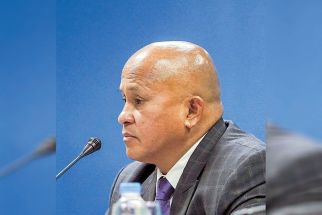Solons want 19 government agencies abolished
September 3, 2001 | 12:00am
The opposition in the House of Representatives will seek the abolition of 10 agencies under the Office of the President (OP) and about nine other entities in various departments to save the government at least P1 billion next year.
"We will propose the scrapping of these offices as a collective stand of the opposition," Minority Leader Carlos Padilla (LDP, Nueva Vizcaya) said yesterday.
He said he and his colleagues will submit the proposal to the appropriations committee chaired by Rep. Rolando Andaya Jr. (Lakas, Camarines Sur) which is conducting hearings on President Arroyo’s recommended P781-billion budget for next year.
He said the offices they will seek to abolish are task forces, councils, committees, and commissions whose functions can be taken over by departments and other agencies and local government units.
"Going over the list of appendages in the President’s office, it doesn’t take much imagination for one to conclude that the job of these offices can be discharged by other agencies," Padilla said.
He added that one task force is for a law that expired several years ago.
The biggest of the offices that opposition congressmen would like scrapped is the Presidential Anti-Organized Crime Commission (PAOCC). Its abolition was proposed by Rep. Abraham Mitra (LDP, Palawan).
The commission has a budget of P576 million for next year, P400 million of which, according to Mitra, is in the form of intelligence funds.
Mrs. Arroyo has disbanded the commission’s principal operating unit, the Presidential Anti-Organized Crime Task Force.
While the minority wants PAOCC abolished, it would go for keeping the National Anti-Crime Commission, which the President recently created and which is under her office. The new body has a P12-million budget for next year.
"We would like to follow the President’s policy of austerity. That is why we are seeking the scrapping of these unnecessary offices. The government can operate without them," Padilla said.
However, he said it seems that it is Mrs. Arroyo who is not taking her policy to heart.
"She kept PAOCC and created another anti-crime commission. These two are overlapping agencies. The job of one is not different from the other," he said.
He said the abolition of the superfluous agencies would also result in the streamlining of the bureaucracy.
The other OP offices the minority wants scrapped are the Mindanao Economic Development Council, North Luzon Growth Commission, Lingayen Gulf Coastal Area Management Commission, Rizal-Laguna-Quezon Growth Area Commission, Mt. Makiling Reserve Area and Laguna de Bay Commission, Presidential Commission on Bicol Tourism Special Development Project;
Sulu Development Task Force, Central Mindanao Development Task Force, Vigan Heritage Village Commission, Agno River Basin Development Commission, Aklan Provincial Tourism Special Development Project Task Force;
Coordinating Council for Private Sector Participation, Banaue Rice Terraces Task Force, Central East Asia Growth Circle Program, Socsargen Area Development Project Office, Mindanao Rail System Task Force, and Task Force 20/20 Initiative.
All these offices have combined appropriations amounting to nearly P1 billion for next year.
Padilla said he and his colleagues are also reviewing the agencies attached to various departments to determine which are superfluous.
He said in the Department of Agriculture for instance, while there is the Bureau of Aquatic and Fishery Resources, there is also a council for fisheries which could be duplicating the functions of the former.
There are two other overlapping entities in the department, the Bureau of Animal Industry and the Livestock Development Council, he said.
Meanwhile, another minority member, Rep. Gilbert Remulla of Cavite, discovered last Friday during the budget hearing on the OP’s P3-billion outlay for next year that Malacañang will buy for its officials at least six cars worth P800,000 each next year.
"Why is the Palace buying additional cars? Doesn’t the government have enough vehicles?" he asked.
Remulla also found out from the shopping list Malacañang submitted to the appropriations committee that there are different prices for similar items to be procured.
One Pentium III computer, for instance, was priced at P80,000, while another has a P100,000 price tag. Even facsimile machines and electric typewriters have different prices.
"Isn’t there supposed to be one standard price for one product or equipment?" he asked.
"We will propose the scrapping of these offices as a collective stand of the opposition," Minority Leader Carlos Padilla (LDP, Nueva Vizcaya) said yesterday.
He said he and his colleagues will submit the proposal to the appropriations committee chaired by Rep. Rolando Andaya Jr. (Lakas, Camarines Sur) which is conducting hearings on President Arroyo’s recommended P781-billion budget for next year.
He said the offices they will seek to abolish are task forces, councils, committees, and commissions whose functions can be taken over by departments and other agencies and local government units.
"Going over the list of appendages in the President’s office, it doesn’t take much imagination for one to conclude that the job of these offices can be discharged by other agencies," Padilla said.
He added that one task force is for a law that expired several years ago.
The biggest of the offices that opposition congressmen would like scrapped is the Presidential Anti-Organized Crime Commission (PAOCC). Its abolition was proposed by Rep. Abraham Mitra (LDP, Palawan).
The commission has a budget of P576 million for next year, P400 million of which, according to Mitra, is in the form of intelligence funds.
Mrs. Arroyo has disbanded the commission’s principal operating unit, the Presidential Anti-Organized Crime Task Force.
While the minority wants PAOCC abolished, it would go for keeping the National Anti-Crime Commission, which the President recently created and which is under her office. The new body has a P12-million budget for next year.
"We would like to follow the President’s policy of austerity. That is why we are seeking the scrapping of these unnecessary offices. The government can operate without them," Padilla said.
However, he said it seems that it is Mrs. Arroyo who is not taking her policy to heart.
"She kept PAOCC and created another anti-crime commission. These two are overlapping agencies. The job of one is not different from the other," he said.
He said the abolition of the superfluous agencies would also result in the streamlining of the bureaucracy.
The other OP offices the minority wants scrapped are the Mindanao Economic Development Council, North Luzon Growth Commission, Lingayen Gulf Coastal Area Management Commission, Rizal-Laguna-Quezon Growth Area Commission, Mt. Makiling Reserve Area and Laguna de Bay Commission, Presidential Commission on Bicol Tourism Special Development Project;
Sulu Development Task Force, Central Mindanao Development Task Force, Vigan Heritage Village Commission, Agno River Basin Development Commission, Aklan Provincial Tourism Special Development Project Task Force;
Coordinating Council for Private Sector Participation, Banaue Rice Terraces Task Force, Central East Asia Growth Circle Program, Socsargen Area Development Project Office, Mindanao Rail System Task Force, and Task Force 20/20 Initiative.
All these offices have combined appropriations amounting to nearly P1 billion for next year.
Padilla said he and his colleagues are also reviewing the agencies attached to various departments to determine which are superfluous.
He said in the Department of Agriculture for instance, while there is the Bureau of Aquatic and Fishery Resources, there is also a council for fisheries which could be duplicating the functions of the former.
There are two other overlapping entities in the department, the Bureau of Animal Industry and the Livestock Development Council, he said.
Meanwhile, another minority member, Rep. Gilbert Remulla of Cavite, discovered last Friday during the budget hearing on the OP’s P3-billion outlay for next year that Malacañang will buy for its officials at least six cars worth P800,000 each next year.
"Why is the Palace buying additional cars? Doesn’t the government have enough vehicles?" he asked.
Remulla also found out from the shopping list Malacañang submitted to the appropriations committee that there are different prices for similar items to be procured.
One Pentium III computer, for instance, was priced at P80,000, while another has a P100,000 price tag. Even facsimile machines and electric typewriters have different prices.
"Isn’t there supposed to be one standard price for one product or equipment?" he asked.
BrandSpace Articles
<
>
- Latest
- Trending
Trending
Latest
Trending
Latest
Recommended
November 28, 2024 - 12:00am




























